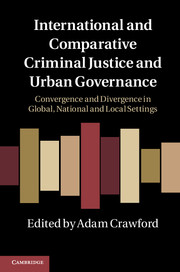 International and Comparative Criminal Justice and Urban Governance
International and Comparative Criminal Justice and Urban Governance Book contents
- Frontmatter
- Contents
- List of figures
- List of tables
- Notes on contributors
- Acknowledgements
- 1 International and comparative criminal justice and urban governance
- PART 1 International criminal justice
- PART 2 Comparative penal policies
- PART 3 Comparative crime control and urban governance
- 15 Victimhood of the national? Denationalising sovereignty in crime control
- 16 Cosmopolitan liberty in the age of terrorism
- 17 Restorative justice and states' uneasy relationship with their publics
- 18 Governing nodal governance: the ‘anchoring’ of local security networks
- 19 From the shopping mall to the street corner: dynamics of exclusion in the governance of public space
- 20 Gating as governance: the boundaries spectrum in social and situational crime prevention
- 21 French perspectives on threats to peace and local social order
- 22 The question of scale in urban criminology
- Index
- References
15 - Victimhood of the national? Denationalising sovereignty in crime control
from PART 3 - Comparative crime control and urban governance
Published online by Cambridge University Press: 05 June 2011
- Frontmatter
- Contents
- List of figures
- List of tables
- Notes on contributors
- Acknowledgements
- 1 International and comparative criminal justice and urban governance
- PART 1 International criminal justice
- PART 2 Comparative penal policies
- PART 3 Comparative crime control and urban governance
- 15 Victimhood of the national? Denationalising sovereignty in crime control
- 16 Cosmopolitan liberty in the age of terrorism
- 17 Restorative justice and states' uneasy relationship with their publics
- 18 Governing nodal governance: the ‘anchoring’ of local security networks
- 19 From the shopping mall to the street corner: dynamics of exclusion in the governance of public space
- 20 Gating as governance: the boundaries spectrum in social and situational crime prevention
- 21 French perspectives on threats to peace and local social order
- 22 The question of scale in urban criminology
- Index
- References
Summary
Weak states is precisely what the New World Order, all too often looking suspiciously like the new world disorder, needs to sustain and reproduce itself.
Bauman 1998: 68There is a growing number of academic ‘–isms’ and ‘–isations’ aiming to describe the trans-border interconnectedness of the contemporary social condition. Internationalisation, globalisation, transnationalisation, glocalisation – to name but some – have become increasingly popular fields of criminological inquiry. A common part of globalisation debates has been an image of failing state sovereignty, even propositions of its withering and death. While newspaper reports, political discourse and activist slogans forcefully mobilise for the rescue of the national under threat, the assumption about the ‘victimhood of the national’ is nevertheless also implicit in much of academic discourse about globalisation and crime. It is an assumption, seldom explicated, yet nevertheless present in various forms and, to greater or lesser extent, in many criminological narratives about globalisation. The growth of unaccountable international surveillance and policing networks and transnational legal orders is seen to be eroding the powers of nation states and, ultimately, raising the question of their survival (Mathiesen 2006). The fall of the golden age of the welfare state under the relentless attacks of neoliberalism offers yet another account of falling state sovereignty. Here, globalisation tends to be equated with its economic motor – neoliberalism – inevitably leading to more social inequality, crime, violence and insecurity and, consequently, increased levels of punitiveness.
- Type
- Chapter
- Information
- International and Comparative Criminal Justice and Urban GovernanceConvergence and Divergence in Global, National and Local Settings, pp. 389 - 412Publisher: Cambridge University PressPrint publication year: 2011
References
- 1
- Cited by


